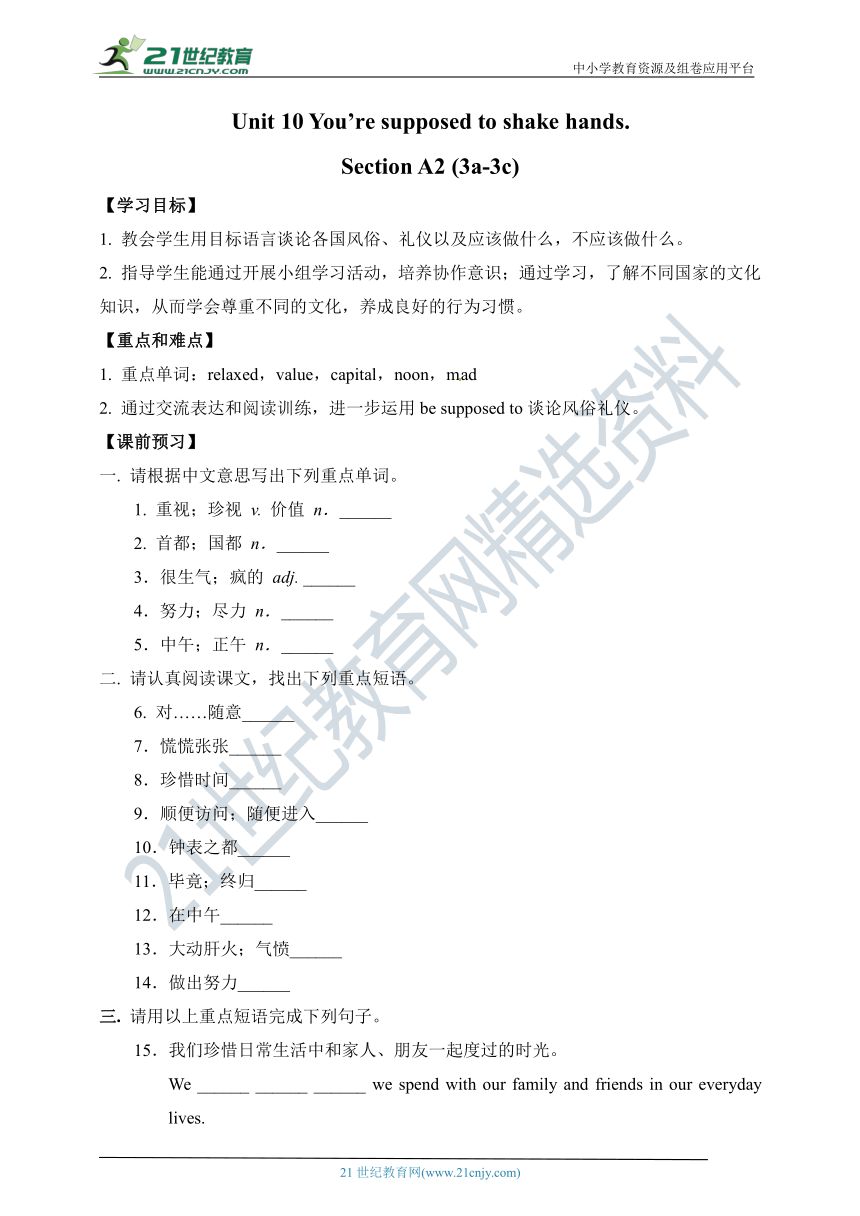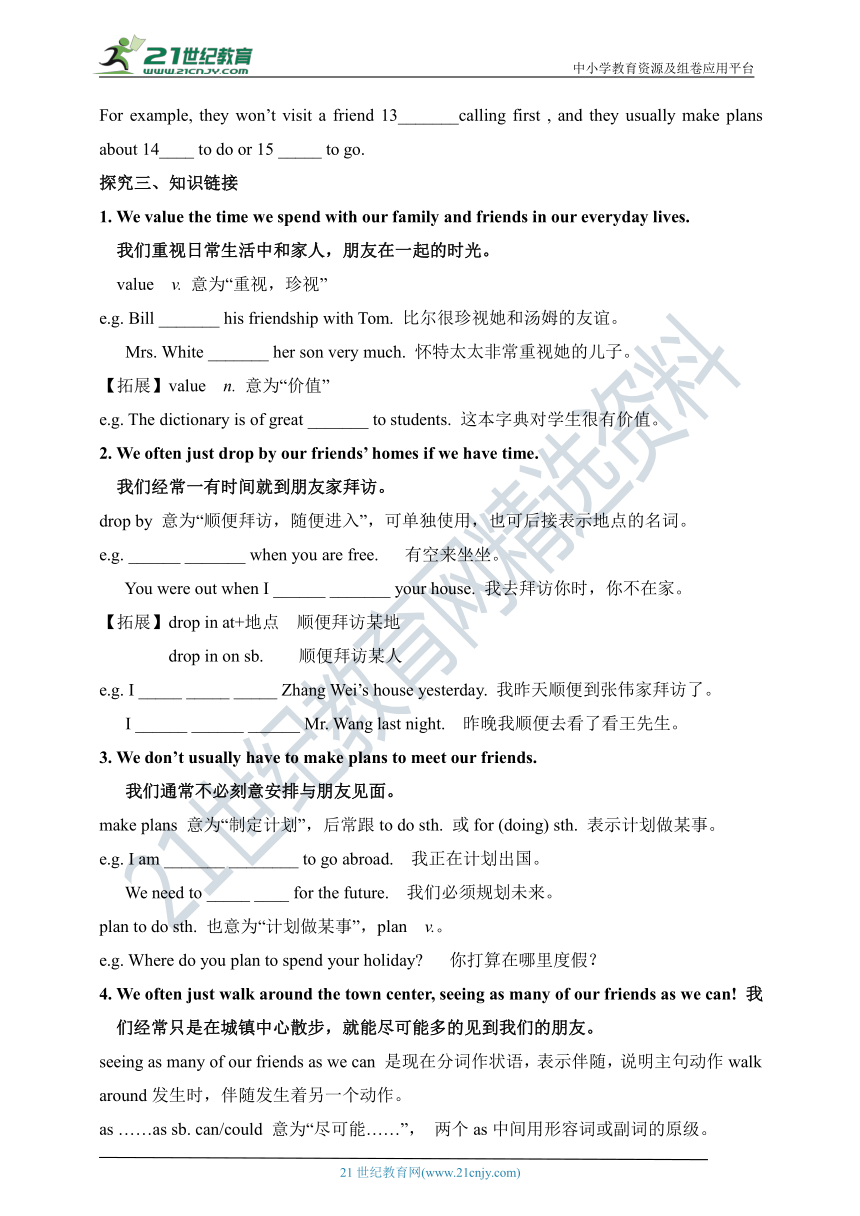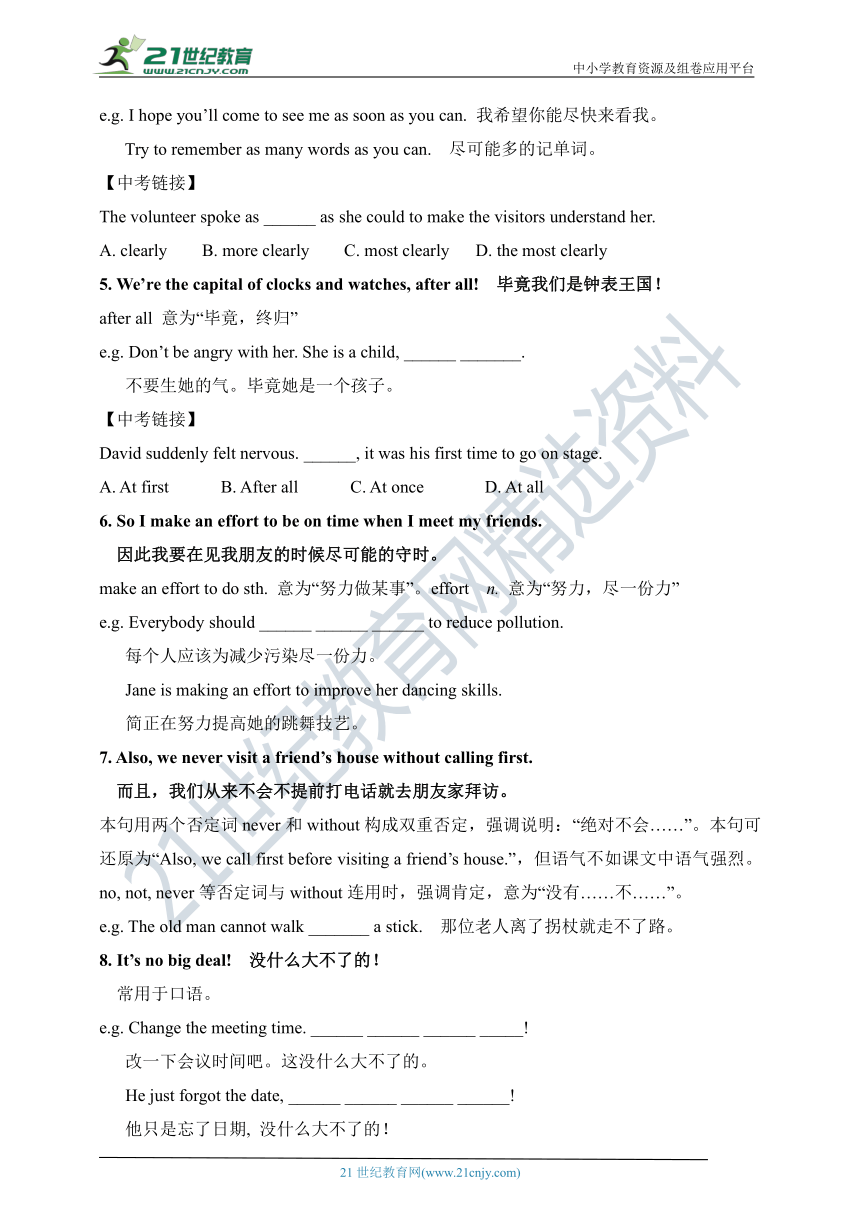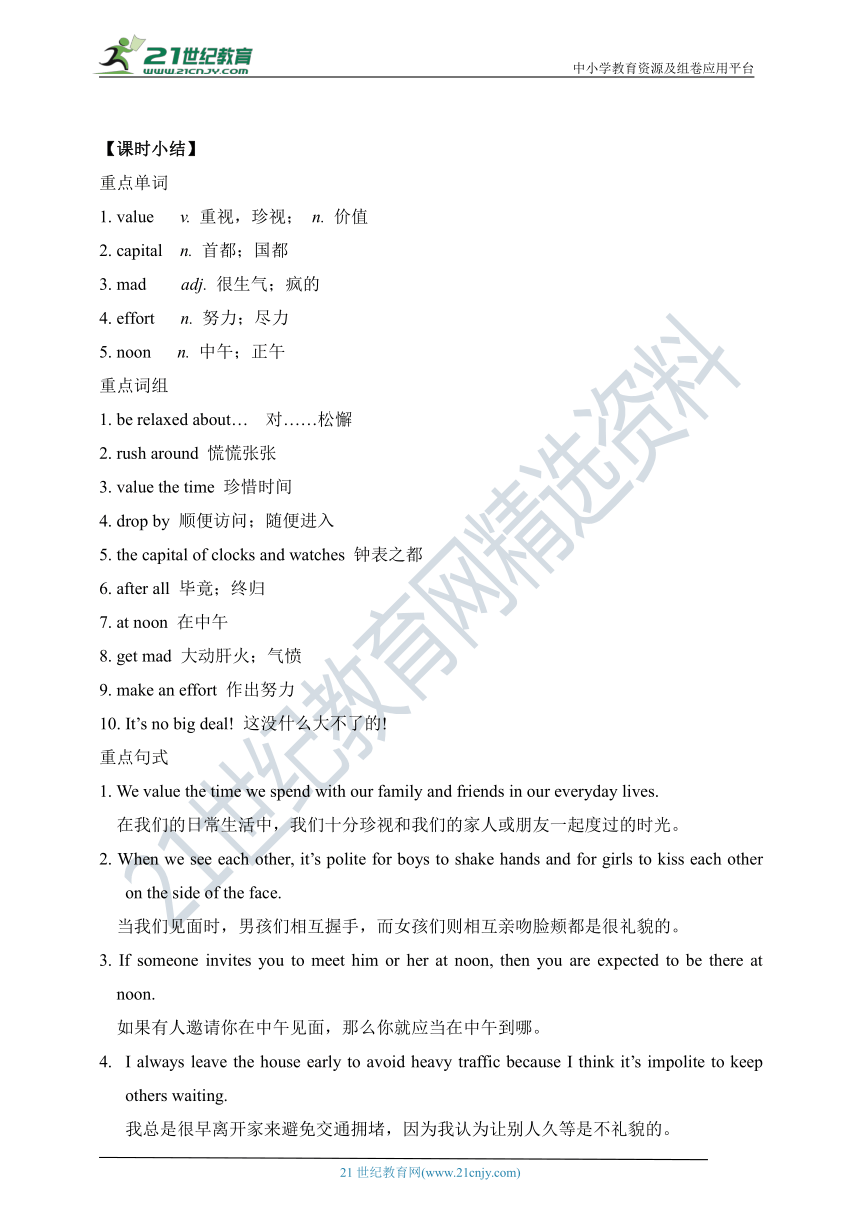Unit 10 You’re supposed to shake hands.Section A2 (3a-3c)优学案(含答案)
文档属性
| 名称 | Unit 10 You’re supposed to shake hands.Section A2 (3a-3c)优学案(含答案) |  | |
| 格式 | zip | ||
| 文件大小 | 1.1MB | ||
| 资源类型 | 试卷 | ||
| 版本资源 | 人教新目标(Go for it)版 | ||
| 科目 | 英语 | ||
| 更新时间 | 2019-08-13 11:47:36 | ||
图片预览





文档简介
Unit 10 You’re supposed to shake hands.
Section A2 (3a-3c)
【学习目标】
1. 教会学生用目标语言谈论各国风俗、礼仪以及应该做什么,不应该做什么。
2. 指导学生能通过开展小组学习活动,培养协作意识;通过学习,了解不同国家的文化知识,从而学会尊重不同的文化,养成良好的行为习惯。
【重点和难点】
1. 重点单词:relaxed,value,capital,noon,mad
2. 通过交流表达和阅读训练,进一步运用be supposed to谈论风俗礼仪。
【课前预习】
一. 请根据中文意思写出下列重点单词。
1. 重视;珍视 v. 价值 n.______
2. 首都;国都 n.______
3.很生气;疯的 adj. ______
4.努力;尽力 n.______
5.中午;正午 n.______
二. 请认真阅读课文,找出下列重点短语。
6. 对……随意______
7.慌慌张张______
8.珍惜时间______
9.顺便访问;随便进入______
10.钟表之都______
11.毕竟;终归______
12.在中午______
13.大动肝火;气愤______
14.做出努力______
三. 请用以上重点短语完成下列句子。
15.我们珍惜日常生活中和家人、朋友一起度过的时光。
We ______ ______ ______ we spend with our family and friends in our everyday lives.
16.如果有人邀请你在中午见面,那么你就应当在中午到那儿。
If someone invites you to meet him or her ______ ______,then you are expected to be there ______ ______.
【合作探究】
探究一、略读文章,回答问题。
Where is she or he from?
____________________________________
What are the two passages mainly about?
____________________________________
In which country is it ok to be 15 minutes late for dinner? How do you know?
____________________________________
探究二、精读文章。
1. 认真读文章第一段,回答下面问题。
1) In Colombia, is it OK if you arrive a bit late for a dinner?
2) Do people in Colombia usually make plans to meet their friends?
3) We often _______ _______ to our friends’ homes if we are _________.
4) We often just walk around the town center, seeing as many of our friends as we can!
2. 认真读文章第二段,找出下面问题的答案。
1) What do people in Switzerland think of time?
___________________________________
2) What are you supposed to do if you want to visit your friends in Switzerland? ___________________________________
3) We’re the capital of clocks and watches, after all!
___________________________________
4) We usually plan to do something interesting, or go somewhere together.
___________________________________
3. 重新读文章,完成下列短文。
The people in Colombia are pretty 1______ about time. It’s OK for them to arrive 2_ 3__ .___ when they go for a dinner. They often just 5___ 6___ their friends without making a plan first. They like 7______ 8_______ the town center to see friends as many as possible. When they meet someone, they must be 9__ 10____, They usually11_____ 12____to do things. For example, they won’t visit a friend 13_______calling first , and they usually make plans about 14____ to do or 15 _____ to go.
探究三、知识链接
1. We value the time we spend with our family and friends in our everyday lives.
我们重视日常生活中和家人,朋友在一起的时光。
value v. 意为“重视,珍视”
e.g. Bill _______ his friendship with Tom. 比尔很珍视她和汤姆的友谊。
Mrs. White _______ her son very much. 怀特太太非常重视她的儿子。
【拓展】value n. 意为“价值”
e.g. The dictionary is of great _______ to students. 这本字典对学生很有价值。
2. We often just drop by our friends’ homes if we have time.
我们经常一有时间就到朋友家拜访。
drop by 意为“顺便拜访,随便进入”,可单独使用,也可后接表示地点的名词。
e.g. ______ _______ when you are free. 有空来坐坐。
You were out when I ______ _______ your house. 我去拜访你时,你不在家。
【拓展】drop in at+地点 顺便拜访某地
drop in on sb. 顺便拜访某人
e.g. I _____ _____ _____ Zhang Wei’s house yesterday. 我昨天顺便到张伟家拜访了。
I ______ ______ ______ Mr. Wang last night. 昨晚我顺便去看了看王先生。
3. We don’t usually have to make plans to meet our friends.
我们通常不必刻意安排与朋友见面。
make plans 意为“制定计划”,后常跟to do sth. 或for (doing) sth. 表示计划做某事。
e.g. I am _______ ________ to go abroad. 我正在计划出国。
We need to _____ ____ for the future. 我们必须规划未来。
plan to do sth. 也意为“计划做某事”,plan v.。
e.g. Where do you plan to spend your holiday? 你打算在哪里度假?
4. We often just walk around the town center, seeing as many of our friends as we can! 我们经常只是在城镇中心散步,就能尽可能多的见到我们的朋友。
seeing as many of our friends as we can 是现在分词作状语,表示伴随,说明主句动作walk around发生时,伴随发生着另一个动作。
as ……as sb. can/could 意为“尽可能……”, 两个as中间用形容词或副词的原级。
e.g. I hope you’ll come to see me as soon as you can. 我希望你能尽快来看我。
Try to remember as many words as you can. 尽可能多的记单词。
【中考链接】
The volunteer spoke as ______ as she could to make the visitors understand her.
A. clearly B. more clearly C. most clearly D. the most clearly
5. We’re the capital of clocks and watches, after all! 毕竟我们是钟表王国!
after all 意为“毕竟,终归”
e.g. Don’t be angry with her. She is a child, ______ _______.
不要生她的气。毕竟她是一个孩子。
【中考链接】
David suddenly felt nervous. ______, it was his first time to go on stage.
A. At first B. After all C. At once D. At all
6. So I make an effort to be on time when I meet my friends.
因此我要在见我朋友的时候尽可能的守时。
make an effort to do sth. 意为“努力做某事”。effort n. 意为“努力,尽一份力”
e.g. Everybody should ______ ______ ______ to reduce pollution.
每个人应该为减少污染尽一份力。
Jane is making an effort to improve her dancing skills.
简正在努力提高她的跳舞技艺。
7. Also, we never visit a friend’s house without calling first.
而且,我们从来不会不提前打电话就去朋友家拜访。
本句用两个否定词never和without构成双重否定,强调说明:“绝对不会……”。本句可还原为“Also, we call first before visiting a friend’s house.”,但语气不如课文中语气强烈。no, not, never等否定词与without连用时,强调肯定,意为“没有……不……”。
e.g. The old man cannot walk _______ a stick. 那位老人离了拐杖就走不了路。
8. It’s no big deal! 没什么大不了的!
常用于口语。
e.g. Change the meeting time. ______ ______ ______ _____!
改一下会议时间吧。这没什么大不了的。
He just forgot the date, ______ ______ ______ ______!
他只是忘了日期, 没什么大不了的!
【课时小结】
重点单词
1. value v. 重视,珍视; n. 价值
2. capital n. 首都;国都
3. mad adj. 很生气;疯的
4. effort n. 努力;尽力
5. noon n. 中午;正午
重点词组
1. be relaxed about… 对……松懈
2. rush around 慌慌张张
3. value the time 珍惜时间
4. drop by 顺便访问;随便进入
5. the capital of clocks and watches 钟表之都
6. after all 毕竟;终归
7. at noon 在中午
8. get mad 大动肝火;气愤
9. make an effort 作出努力
10. It’s no big deal! 这没什么大不了的!
重点句式
1. We value the time we spend with our family and friends in our everyday lives.
在我们的日常生活中,我们十分珍视和我们的家人或朋友一起度过的时光。
2. When we see each other, it’s polite for boys to shake hands and for girls to kiss each other on the side of the face.
当我们见面时,男孩们相互握手,而女孩们则相互亲吻脸颊都是很礼貌的。
3. If someone invites you to meet him or her at noon, then you are expected to be there at noon.
如果有人邀请你在中午见面,那么你就应当在中午到哪。
I always leave the house early to avoid heavy traffic because I think it’s impolite to keep others waiting.
我总是很早离开家来避免交通拥堵,因为我认为让别人久等是不礼貌的。
【达标检测】
一. 用所给单词的适当形式填空。
1. You are ______ (suppose) to shake hands when you meet a Chinese friend.
2. Keep your eyes ______(close) when you are doing eye exercises.
3. Remember ________(turn off) the light when you leave the room.
4. Trees can keep water from _______ (run) away.
5. I ________ ( spend ) time with family and friends is very important.
6. Though you failed this time, don’t give up______ (study) .You still have a lot of chances.
7. ( walk ) a few minutes every day is good for our health
8. Don’t visit your friends without ( call ) first in western countries
9. Little Jimmy always plans ( do ) something interesting.
10. Everyone should work as ( hard ) as he can.
二. 单项填空。
1. People are _______ to _______ when they meet for the first time.
A. suppose; shake hand B. supposed; shake hands
C. supposed; shake hand D. suppose; shook hands
2. When ________ you supposed to ________ the meeting yesterday?
A. were; had B. was; had C. were; have D. was; have
3. We often _______ our friends’ homes without _______ them first.
A. drop by; call B. drop by; calling C. visit; call D. visits; calling
4. It’s _______ to point at others with your chopsticks.
A. polite B. rude C. correct D. good
5. I think you should help him._______, he is your close friend.
A. All right B. After all C. At all D. In al
6. Try your best, Linda, It’s only difficult for you , you can do it well.
A. a bit of B. a bit C. a lot of D. a lot
7 .Is there in today’s newspaper?
A something important B. anything important
C important something D. important anything
8. The twins sat in the sun, a story book together
A. to read B. reading C. to watch D. watching
9. Don’t be late next time. You _________ earlier.
A. are supposed to come B. are supposed come
C. are supposed to coming D. suppose coming
10. Liu Jia usually goes to school without breakfast, he is really pale.
A. to eat B. eats C. eating D. eats
三. 根据汉语意思完成句子,每空一词。
1. 请你告诉我韩国的餐桌礼仪好吗?
Could you please tell me at the dinner table in Korea?
2. 他的话使我感到宾至如归。
What he said .
3. 他们格外努力地学习中国文化。
They to learn about Chinese culture.
4. 现在我讲德语轻松自如。
I am very German now.
5. 我最大的困难就是我对印度的习俗一无所知。
My is that I know nothing about the in India.
四. 从方框中选择适当的选项完成对话。
A: What kinds of rules do they have in Colombia?
B: Well, they have pretty relaxed rules.
A: Like what?
B: 1____________________.
A: Could you give me an example?
B: Sure. If they tell a friend they’re going to his or her house for dinner, it’s okay if they arrive a bit late.
A: Do they often visit friends’ houses?
B: Yes, they do. It is very important to them. 2___________________.
A: Do they have to make plans to do that?
B: 3________________. Often they just walk around the town center, seeing as many of their friends as they can!
A: What kinds of rules do they have in Switzerland?
B: It’s very important for them to be on time.
A: Because they’re the land of watches.
B: Maybe. 4________________.
A: If you are even fifteen minutes late, may your friend get angry?
B: Yes, they do.
A: Do they often visit a friend’s house?
B: Sometimes. But they never go without calling first. 5_________________. They usually plan to do something interesting, or go somewhere together.
A. They don’t usually have to make plans to meet their friends
B. If someone invites you to meet him/ her at 4:00, you have to be there at 4:00
C. They often just drop by their friends’ homes
D. They usually make plans to see friends
E. Well, it’s OK if you’re not on time
【自我评价】
1. 本课我学会了什么?
_____________________________________________________
2. 通过本课的学习,我还有哪些疑问?
____________________________________________________
参考答案:
【课前预习】
1. value
2. capital
3. mad
4. effort
5. noon
6. be relaxed about…
7. rush around
8. value the time
9. drop by
10. the capital of clocks and watches
11. after all
12. at noon
13. get mad
14. make an effort
15. value the time
16. at noon
探究一
1. Colombia;Switzerland
2. Different customs between Colombian and Swiss
3. From the sentences ‘we’re pretty relaxed about time.” and “It’s OK if you arrive a bit late.”
探究二
1. Yes.; No.; come over ; free
我们经常只是在城镇中心走动,就会尽可能多的看到我们的朋友。
2. They think it’s very important to be on time.
I am supposed to make plans.
毕竟,我们是钟表王国!
我们通常计划一起做一些有趣的事情,或一起去某个地方。
3. relaxed a bit late drop by walking around on time make plans without what where
探究三
1. values; values; value
2. drop by; dropped by; dropped in at; dropped in on
3. making plans ; make plans
4. A
5. after all; B
6. make an effort
7. without
8. it’s no big deal; it’s no big deal
【达标检测】
一、1. supposed 2. closed 3. to turn off 4. running 5. spend
6. studying 7. Walking 8. calling 9. to do 10. hard
二、 1. C 2. C 3. B 4. B 5. B 6. B 7. B 8. B 9. A 10. C
三、1. how to behave 2. made me feel at home 3. go out of their way
4. comfortable speaking 5. biggest challenge; customs
四. 1. E 2. C 3. A 4. B 5. D
Section A2 (3a-3c)
【学习目标】
1. 教会学生用目标语言谈论各国风俗、礼仪以及应该做什么,不应该做什么。
2. 指导学生能通过开展小组学习活动,培养协作意识;通过学习,了解不同国家的文化知识,从而学会尊重不同的文化,养成良好的行为习惯。
【重点和难点】
1. 重点单词:relaxed,value,capital,noon,mad
2. 通过交流表达和阅读训练,进一步运用be supposed to谈论风俗礼仪。
【课前预习】
一. 请根据中文意思写出下列重点单词。
1. 重视;珍视 v. 价值 n.______
2. 首都;国都 n.______
3.很生气;疯的 adj. ______
4.努力;尽力 n.______
5.中午;正午 n.______
二. 请认真阅读课文,找出下列重点短语。
6. 对……随意______
7.慌慌张张______
8.珍惜时间______
9.顺便访问;随便进入______
10.钟表之都______
11.毕竟;终归______
12.在中午______
13.大动肝火;气愤______
14.做出努力______
三. 请用以上重点短语完成下列句子。
15.我们珍惜日常生活中和家人、朋友一起度过的时光。
We ______ ______ ______ we spend with our family and friends in our everyday lives.
16.如果有人邀请你在中午见面,那么你就应当在中午到那儿。
If someone invites you to meet him or her ______ ______,then you are expected to be there ______ ______.
【合作探究】
探究一、略读文章,回答问题。
Where is she or he from?
____________________________________
What are the two passages mainly about?
____________________________________
In which country is it ok to be 15 minutes late for dinner? How do you know?
____________________________________
探究二、精读文章。
1. 认真读文章第一段,回答下面问题。
1) In Colombia, is it OK if you arrive a bit late for a dinner?
2) Do people in Colombia usually make plans to meet their friends?
3) We often _______ _______ to our friends’ homes if we are _________.
4) We often just walk around the town center, seeing as many of our friends as we can!
2. 认真读文章第二段,找出下面问题的答案。
1) What do people in Switzerland think of time?
___________________________________
2) What are you supposed to do if you want to visit your friends in Switzerland? ___________________________________
3) We’re the capital of clocks and watches, after all!
___________________________________
4) We usually plan to do something interesting, or go somewhere together.
___________________________________
3. 重新读文章,完成下列短文。
The people in Colombia are pretty 1______ about time. It’s OK for them to arrive 2_ 3__ .___ when they go for a dinner. They often just 5___ 6___ their friends without making a plan first. They like 7______ 8_______ the town center to see friends as many as possible. When they meet someone, they must be 9__ 10____, They usually11_____ 12____to do things. For example, they won’t visit a friend 13_______calling first , and they usually make plans about 14____ to do or 15 _____ to go.
探究三、知识链接
1. We value the time we spend with our family and friends in our everyday lives.
我们重视日常生活中和家人,朋友在一起的时光。
value v. 意为“重视,珍视”
e.g. Bill _______ his friendship with Tom. 比尔很珍视她和汤姆的友谊。
Mrs. White _______ her son very much. 怀特太太非常重视她的儿子。
【拓展】value n. 意为“价值”
e.g. The dictionary is of great _______ to students. 这本字典对学生很有价值。
2. We often just drop by our friends’ homes if we have time.
我们经常一有时间就到朋友家拜访。
drop by 意为“顺便拜访,随便进入”,可单独使用,也可后接表示地点的名词。
e.g. ______ _______ when you are free. 有空来坐坐。
You were out when I ______ _______ your house. 我去拜访你时,你不在家。
【拓展】drop in at+地点 顺便拜访某地
drop in on sb. 顺便拜访某人
e.g. I _____ _____ _____ Zhang Wei’s house yesterday. 我昨天顺便到张伟家拜访了。
I ______ ______ ______ Mr. Wang last night. 昨晚我顺便去看了看王先生。
3. We don’t usually have to make plans to meet our friends.
我们通常不必刻意安排与朋友见面。
make plans 意为“制定计划”,后常跟to do sth. 或for (doing) sth. 表示计划做某事。
e.g. I am _______ ________ to go abroad. 我正在计划出国。
We need to _____ ____ for the future. 我们必须规划未来。
plan to do sth. 也意为“计划做某事”,plan v.。
e.g. Where do you plan to spend your holiday? 你打算在哪里度假?
4. We often just walk around the town center, seeing as many of our friends as we can! 我们经常只是在城镇中心散步,就能尽可能多的见到我们的朋友。
seeing as many of our friends as we can 是现在分词作状语,表示伴随,说明主句动作walk around发生时,伴随发生着另一个动作。
as ……as sb. can/could 意为“尽可能……”, 两个as中间用形容词或副词的原级。
e.g. I hope you’ll come to see me as soon as you can. 我希望你能尽快来看我。
Try to remember as many words as you can. 尽可能多的记单词。
【中考链接】
The volunteer spoke as ______ as she could to make the visitors understand her.
A. clearly B. more clearly C. most clearly D. the most clearly
5. We’re the capital of clocks and watches, after all! 毕竟我们是钟表王国!
after all 意为“毕竟,终归”
e.g. Don’t be angry with her. She is a child, ______ _______.
不要生她的气。毕竟她是一个孩子。
【中考链接】
David suddenly felt nervous. ______, it was his first time to go on stage.
A. At first B. After all C. At once D. At all
6. So I make an effort to be on time when I meet my friends.
因此我要在见我朋友的时候尽可能的守时。
make an effort to do sth. 意为“努力做某事”。effort n. 意为“努力,尽一份力”
e.g. Everybody should ______ ______ ______ to reduce pollution.
每个人应该为减少污染尽一份力。
Jane is making an effort to improve her dancing skills.
简正在努力提高她的跳舞技艺。
7. Also, we never visit a friend’s house without calling first.
而且,我们从来不会不提前打电话就去朋友家拜访。
本句用两个否定词never和without构成双重否定,强调说明:“绝对不会……”。本句可还原为“Also, we call first before visiting a friend’s house.”,但语气不如课文中语气强烈。no, not, never等否定词与without连用时,强调肯定,意为“没有……不……”。
e.g. The old man cannot walk _______ a stick. 那位老人离了拐杖就走不了路。
8. It’s no big deal! 没什么大不了的!
常用于口语。
e.g. Change the meeting time. ______ ______ ______ _____!
改一下会议时间吧。这没什么大不了的。
He just forgot the date, ______ ______ ______ ______!
他只是忘了日期, 没什么大不了的!
【课时小结】
重点单词
1. value v. 重视,珍视; n. 价值
2. capital n. 首都;国都
3. mad adj. 很生气;疯的
4. effort n. 努力;尽力
5. noon n. 中午;正午
重点词组
1. be relaxed about… 对……松懈
2. rush around 慌慌张张
3. value the time 珍惜时间
4. drop by 顺便访问;随便进入
5. the capital of clocks and watches 钟表之都
6. after all 毕竟;终归
7. at noon 在中午
8. get mad 大动肝火;气愤
9. make an effort 作出努力
10. It’s no big deal! 这没什么大不了的!
重点句式
1. We value the time we spend with our family and friends in our everyday lives.
在我们的日常生活中,我们十分珍视和我们的家人或朋友一起度过的时光。
2. When we see each other, it’s polite for boys to shake hands and for girls to kiss each other on the side of the face.
当我们见面时,男孩们相互握手,而女孩们则相互亲吻脸颊都是很礼貌的。
3. If someone invites you to meet him or her at noon, then you are expected to be there at noon.
如果有人邀请你在中午见面,那么你就应当在中午到哪。
I always leave the house early to avoid heavy traffic because I think it’s impolite to keep others waiting.
我总是很早离开家来避免交通拥堵,因为我认为让别人久等是不礼貌的。
【达标检测】
一. 用所给单词的适当形式填空。
1. You are ______ (suppose) to shake hands when you meet a Chinese friend.
2. Keep your eyes ______(close) when you are doing eye exercises.
3. Remember ________(turn off) the light when you leave the room.
4. Trees can keep water from _______ (run) away.
5. I ________ ( spend ) time with family and friends is very important.
6. Though you failed this time, don’t give up______ (study) .You still have a lot of chances.
7. ( walk ) a few minutes every day is good for our health
8. Don’t visit your friends without ( call ) first in western countries
9. Little Jimmy always plans ( do ) something interesting.
10. Everyone should work as ( hard ) as he can.
二. 单项填空。
1. People are _______ to _______ when they meet for the first time.
A. suppose; shake hand B. supposed; shake hands
C. supposed; shake hand D. suppose; shook hands
2. When ________ you supposed to ________ the meeting yesterday?
A. were; had B. was; had C. were; have D. was; have
3. We often _______ our friends’ homes without _______ them first.
A. drop by; call B. drop by; calling C. visit; call D. visits; calling
4. It’s _______ to point at others with your chopsticks.
A. polite B. rude C. correct D. good
5. I think you should help him._______, he is your close friend.
A. All right B. After all C. At all D. In al
6. Try your best, Linda, It’s only difficult for you , you can do it well.
A. a bit of B. a bit C. a lot of D. a lot
7 .Is there in today’s newspaper?
A something important B. anything important
C important something D. important anything
8. The twins sat in the sun, a story book together
A. to read B. reading C. to watch D. watching
9. Don’t be late next time. You _________ earlier.
A. are supposed to come B. are supposed come
C. are supposed to coming D. suppose coming
10. Liu Jia usually goes to school without breakfast, he is really pale.
A. to eat B. eats C. eating D. eats
三. 根据汉语意思完成句子,每空一词。
1. 请你告诉我韩国的餐桌礼仪好吗?
Could you please tell me at the dinner table in Korea?
2. 他的话使我感到宾至如归。
What he said .
3. 他们格外努力地学习中国文化。
They to learn about Chinese culture.
4. 现在我讲德语轻松自如。
I am very German now.
5. 我最大的困难就是我对印度的习俗一无所知。
My is that I know nothing about the in India.
四. 从方框中选择适当的选项完成对话。
A: What kinds of rules do they have in Colombia?
B: Well, they have pretty relaxed rules.
A: Like what?
B: 1____________________.
A: Could you give me an example?
B: Sure. If they tell a friend they’re going to his or her house for dinner, it’s okay if they arrive a bit late.
A: Do they often visit friends’ houses?
B: Yes, they do. It is very important to them. 2___________________.
A: Do they have to make plans to do that?
B: 3________________. Often they just walk around the town center, seeing as many of their friends as they can!
A: What kinds of rules do they have in Switzerland?
B: It’s very important for them to be on time.
A: Because they’re the land of watches.
B: Maybe. 4________________.
A: If you are even fifteen minutes late, may your friend get angry?
B: Yes, they do.
A: Do they often visit a friend’s house?
B: Sometimes. But they never go without calling first. 5_________________. They usually plan to do something interesting, or go somewhere together.
A. They don’t usually have to make plans to meet their friends
B. If someone invites you to meet him/ her at 4:00, you have to be there at 4:00
C. They often just drop by their friends’ homes
D. They usually make plans to see friends
E. Well, it’s OK if you’re not on time
【自我评价】
1. 本课我学会了什么?
_____________________________________________________
2. 通过本课的学习,我还有哪些疑问?
____________________________________________________
参考答案:
【课前预习】
1. value
2. capital
3. mad
4. effort
5. noon
6. be relaxed about…
7. rush around
8. value the time
9. drop by
10. the capital of clocks and watches
11. after all
12. at noon
13. get mad
14. make an effort
15. value the time
16. at noon
探究一
1. Colombia;Switzerland
2. Different customs between Colombian and Swiss
3. From the sentences ‘we’re pretty relaxed about time.” and “It’s OK if you arrive a bit late.”
探究二
1. Yes.; No.; come over ; free
我们经常只是在城镇中心走动,就会尽可能多的看到我们的朋友。
2. They think it’s very important to be on time.
I am supposed to make plans.
毕竟,我们是钟表王国!
我们通常计划一起做一些有趣的事情,或一起去某个地方。
3. relaxed a bit late drop by walking around on time make plans without what where
探究三
1. values; values; value
2. drop by; dropped by; dropped in at; dropped in on
3. making plans ; make plans
4. A
5. after all; B
6. make an effort
7. without
8. it’s no big deal; it’s no big deal
【达标检测】
一、1. supposed 2. closed 3. to turn off 4. running 5. spend
6. studying 7. Walking 8. calling 9. to do 10. hard
二、 1. C 2. C 3. B 4. B 5. B 6. B 7. B 8. B 9. A 10. C
三、1. how to behave 2. made me feel at home 3. go out of their way
4. comfortable speaking 5. biggest challenge; customs
四. 1. E 2. C 3. A 4. B 5. D
同课章节目录
- Unit 1 How can we become good learners.
- Section A
- Section B
- Unit 2 I think that mooncakes are delicious!
- Section A
- Section B
- Unit 3 Could you please tell me where the restroom
- Section A
- Section B
- Unit 4 I used to be afraid of the dark.
- Section A
- Section B
- Unit 5 What are the shirts made of?
- Section A
- Section B
- Review of Units 1-5
- Unit 6 When was it invented?
- Section A
- Section B
- Unit 7 Teenagers should be allowed to choose their
- Section A
- Section B
- Unit 8 It must belong to Carla.
- Section A
- Section B
- Unit 9 I like music that I can dance to.
- Section A
- Section B
- Unit 10 You're supposed to shake hands.
- Section A
- Section B
- Review of Units 6-10
- Unit 11 Sad movies make me cry.
- Section A
- Section B
- Unit 12 Life is full of the unexpected
- Section A
- Section B
- Unit 13 We're trying to save the earth!
- Section A
- Section B
- Unit 14 I remember meeting all of you in Grade 7.
- Section A
- Section B
- Review of Units 11-14
